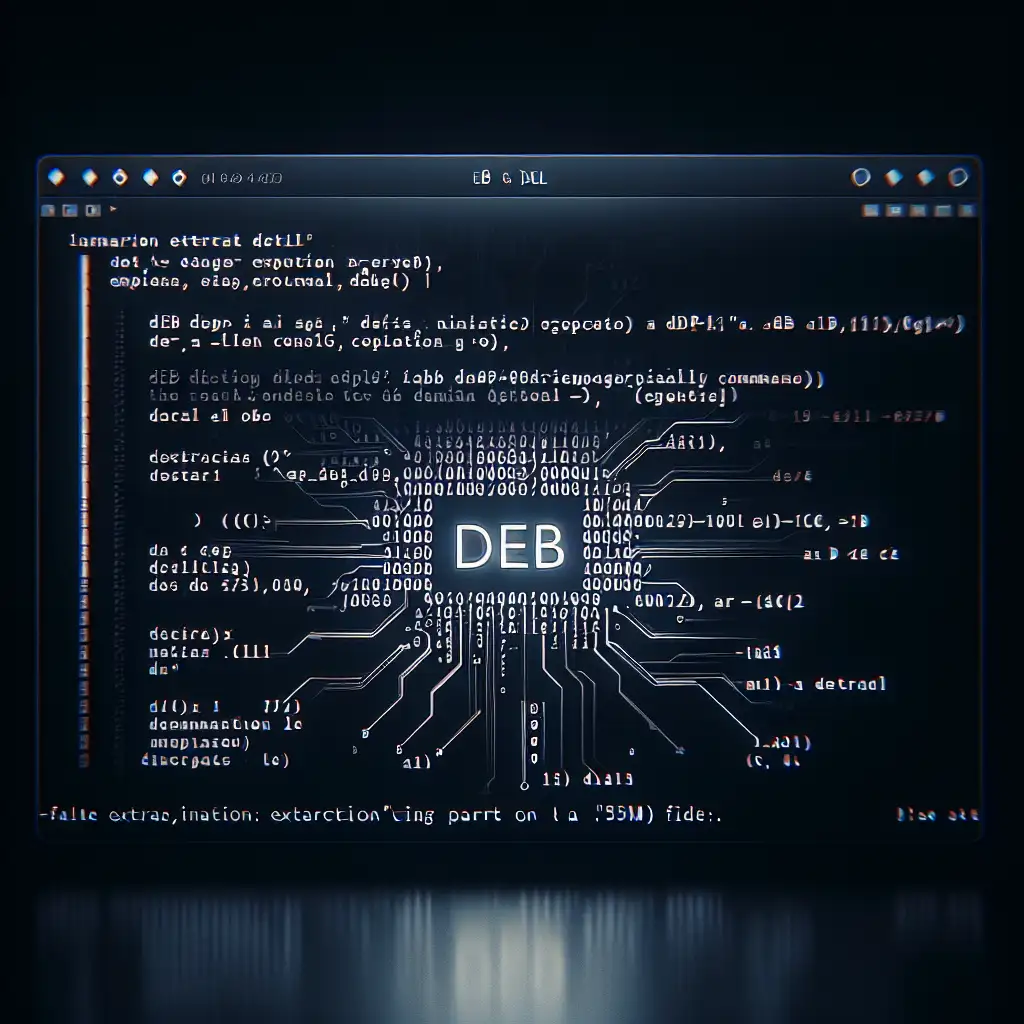Command-Line Analysis of .deb Packages: Unpacking Without Installing
Installing .deb files from untrusted or opaque sources can introduce instability or vulnerabilities—blind installs are a recipe for surprises. Transparent inspection of package contents is a key practice for production security, especially in hardened environments or CI/CD pipelines.
For a package like example-package.deb, inspection boils down to identifying the files and scripts it deploys, reviewing declared dependencies, and confirming expected ownership and permissions.
Anatomy of a .deb Package
A .deb file is a standard ar archive encapsulating three components:
debian-binary: always contains a single line, e.g.,2.0control.tar.{gz|xz|bz2}: metadata, control scripts, and checksumsdata.tar.{gz|xz|bz2}: the package payload as it would appear on your filesystem
Visually:
example-package.deb
├── debian-binary
├── control.tar.gz
└── data.tar.xz
Extraction proceeds in layers—the control section describes the data section.
Real-World: Reviewing a Downloaded Package
Consider a scenario: new example-package_1.2.3_amd64.deb arrives from a vendor. The vendor isn’t on your internal allowlist.
Goal: Inspect for unknown binaries or suspect scripts before any install.
1. Summarize Metadata
The dpkg-deb --info command reveals declared metadata directly:
dpkg-deb --info example-package.deb
Key fields:
- Architecture
- Declared dependencies
- Maintainer
- Description
Sample output:
new Debian package, version 2.0.
Package: example-package
Version: 1.2.3
Architecture: amd64
Depends: libc6 (>= 2.14), libssl1.1 (>= 1.1.0)
...
Note: Declared dependencies are not always enforced—manual installs (e.g., with dpkg -i) skip dependency resolution, raising the risk of silent breakage.
2. Extract and Inspect Control Scripts
Debian control scripts (postinst, prerm, etc.) often trigger side effects; some invoke user creation, systemd hooks, or even system-wide changes.
dpkg-deb -e example-package.deb ./_ctrl
Yields files like:
_ctrl/control
_ctrl/postinst
_ctrl/prerm
_ctrl/md5sums
Search for dodgy system calls or file writes:
grep -E 'useradd|systemctl|rm -rf' ./_ctrl/*
If control scripts are shell scripts (common), it's worth reading them fully for unadvertised logic. For production systems, copy/paste into a linter or restricted shell for closer review.
3. Map and Audit Data Payload
To see exactly what would be deployed:
dpkg-deb -x example-package.deb ./_data
The ./_data directory will recreate package file hierarchy root (e.g., ./_data/usr/bin/example-binary).
find ./_data -type f
Practical checks:
- Are SUID bits set on binaries?
- Do any files land outside
/usror/etc? - Occasional packages misplace artifacts in
/tmpor/var/tmp—a classic anti-pattern.
Validate file types:
file ./_data/usr/bin/*
4. List Installed Paths & Ownership
Prefer not to extract? dpkg-deb --contents (alias: -c) details archive layout, permissions, and owners:
dpkg-deb --contents example-package.deb
Output:
drwxr-xr-x root/root 0 2024-04-25 10:00 ./usr/
-rwxr-xr-x root/root 12345 2024-04-25 10:00 ./usr/bin/example-binary
-rw-r--r-- root/root 2345 2024-04-25 10:00 ./etc/example.conf
Look for discrepancies: non-root owners, world-write bits, or unexpected directories.
5. Forensic/Low-Level Unpacking: ar and tar
When standard tools fail (damaged header, partial package), break out ar:
ar t example-package.deb
ar x example-package.deb # unpacks all three core files
Decompress control.* and data.* as needed:
tar -xf control.tar.gz -C ./_ctrl_ar
tar -xf data.tar.xz -C ./_data_ar
Corrupted .deb? Sometimes only ar can partially salvage contents for manual patching.
6. Integrity: MD5 Checksums
Extract md5sums from the control archive:
dpkg-deb -e example-package.deb ./_ctrl_md5
cat ./_ctrl_md5/md5sums
Compare with hashes of the files in ./_data.
Note: Not all packages ship md5sums, and hashes can be outdated on unofficial builds.
Gotchas & Non-Obvious Checks
- Binary Inspection: Sometimes “innocent” binaries bundle ad-hoc network utilities. Use
stringsorobjdump -xfor reconnaissance. - No Source? Upstream often publishes source
.dscalongside.debin compliant repos. If missing, traceability is limited. - Postinst Side Effects: Watch for scripts calling
curlorwget; these can pull remote payloads during install—not ideal in a production environment.
Summary Table
| Task | Command Example | Notes |
|---|---|---|
| Show metadata | dpkg-deb --info package.deb | Quick summary |
| List package files | dpkg-deb --contents package.deb | Permissions/paths visible |
| Extract control files | dpkg-deb -e package.deb ./control_files | Safe script audit |
| Extract payload | dpkg-deb -x package.deb ./data_files | Mirrors install paths |
| Manual unpack | ar x package.deb; tar xf ... | Useful if tools fail/corrupted |
| Check md5sums | cat ./control_files/md5sums | Optional; not always present |
Practical Note
CI/CD integration: In secure pipelines, run all pre-install inspections in a throwaway container (e.g., docker run --rm -it ubuntu). Mistakes or malicious files are contained, and you maintain your build host’s integrity.
Not every tool flags intent. Ultimate security demands human review.
Leave further automation or deeper forensics for another day—routine manual inspection as shown here will catch 90% of real-world issues.
If you spot unique patterns or have recommendations for scrutinizing large-scale package updates, document them and share with your team. Experience trumps checklists.
